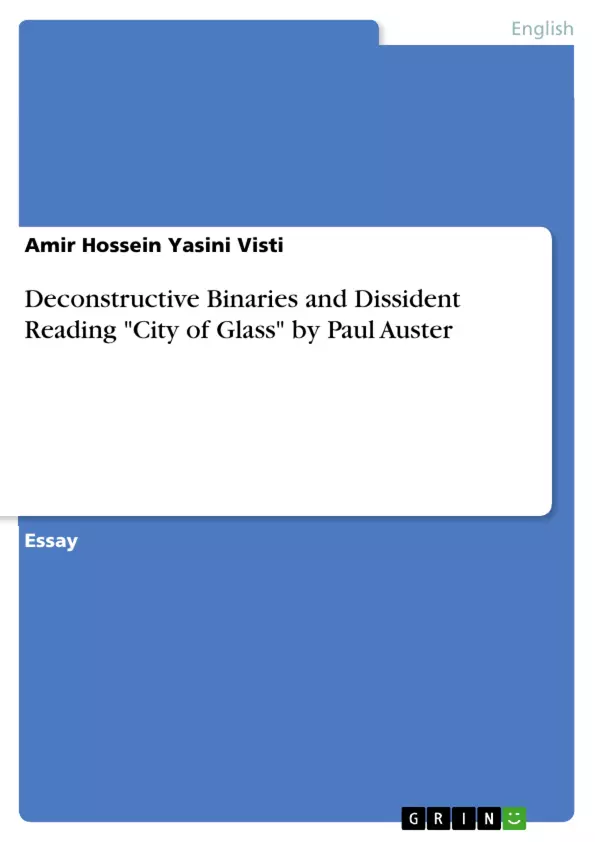The aim of the present paper is to unveil how a "dissident" reading can be perceived by a deconstructive investigation in the novel "City of Glass" by Paul Auster. As the matter of fact, the story entails some binaries which their clashes serve to conceptualize the term "dissidence" as observed in the approach of cultural materialism. Cultural materialists argue that literature does not reflect only one cultural formation and is able to invoke other ideologies and subcultures.
To put in other words, while a literary work may serve to practice the dominant ideology, it may produce a contrary dissident reading. This possibility mostly is based on the inner contradictions of any literary text. This is the common ground of cultural materialists and post-structuralist deconstructionists although there are many differences between the two sides such as the former opposes the latter, arguing that texts are not created in the void.
In fact, the inner contradictions, which the theories and principles of cultural materialism is rested on, can be realized as those dualities which the deconstructionists apply in their practices. They imply that no transcendental meaning is present in the verbal game of a work of literature as the cultural materialists deny one dominant culture. In "City of Glass" Paul Auster has skillfully exhibited such a verbal game to represent his own concerns regarding the subject of the identity caught in the binaries of "author-reader", "fact-fiction", "solitude-loneliness" and "city-space", leading to a "dissident" reading which is potentially opposed and threatening to those social oppressive norms which the protagonist "Quinn" is suffered.
Inhaltsverzeichnis (Table of Contents)
- Introduction
- Methodology
- Cultural Materialism
- Dissidence and Inner Contradictions
- Marginalization and Exclusion
- Discussion
- Author-Reader Relationship
- Fact-Fiction Binary
- Solitude-Loneliness and City-Space Binaries
- Conclusion
Zielsetzung und Themenschwerpunkte (Objectives and Key Themes)
This paper examines the concept of "dissident" reading within the context of Paul Auster's novel City of Glass. It explores how the novel's deconstructive approach to binary concepts, such as "author-reader" and "fact-fiction," challenges traditional notions of identity and societal norms.
- Deconstruction of binary concepts in literature
- Dissident reading and its implications
- Cultural materialism and its relevance to literary analysis
- Paul Auster's postmodern worldview
- The role of identity and self-discovery in the novel
Zusammenfassung der Kapitel (Chapter Summaries)
The introduction sets the stage for the paper, outlining the key concepts of "dissident" reading and cultural materialism. It also provides an overview of Paul Auster's City of Glass, highlighting its postmodern elements and the central role of identity.
The methodology chapter delves into the theoretical framework of cultural materialism. It explores the concept of dissidence as arising from the internal contradictions within any social order. This chapter also discusses the application of cultural materialism to literary texts, focusing on how literature can both reflect and challenge power structures.
The discussion chapter examines the deconstructive binaries present in City of Glass, focusing on the challenges to the traditional author-reader relationship, the blurring of fact and fiction, and the interplay of solitude, loneliness, and the urban environment.
Schlüsselwörter (Keywords)
The key terms and concepts explored in this paper include: Paul Auster, City of Glass, cultural materialism, dissidence, binaries, identity, postmodernism, deconstruction, author-reader relationship, fact-fiction, solitude-loneliness, city-space, narrative, literary theory, ideology, and power relations.
Frequently Asked Questions
What is the main objective of the paper on Paul Auster's "City of Glass"?
The paper aims to unveil how a "dissident" reading can be achieved through a deconstructive investigation of the novel, focusing on binary clashes.
How is cultural materialism applied to the analysis of the novel?
Cultural materialism is used to argue that literature can invoke ideologies and subcultures that challenge the dominant cultural formation, leading to dissident readings.
Which binary concepts are deconstructed in this study?
The study focuses on binaries such as "author-reader", "fact-fiction", "solitude-loneliness", and "city-space".
What does "dissident reading" mean in this context?
It refers to a reading that opposes and threatens social oppressive norms and dominant ideologies by exposing the inner contradictions of a literary text.
How does Paul Auster represent identity in "City of Glass"?
Auster represents identity as being caught in verbal games and binary oppositions, reflecting a postmodern worldview where transcendental meaning is absent.
- Quote paper
- Amir Hossein Yasini Visti (Author), 2014, Deconstructive Binaries and Dissident Reading "City of Glass" by Paul Auster, Munich, GRIN Verlag, https://www.grin.com/document/384244



